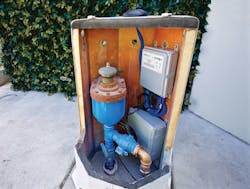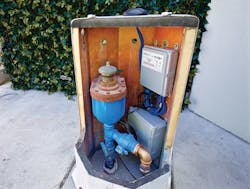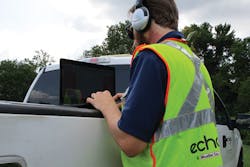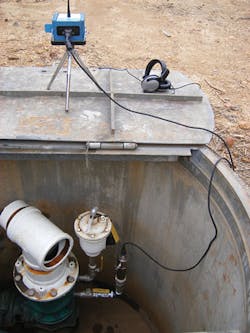Las Vegas Utility Refuses to Gamble with Water Mains
Pipe condition assessment and leak detection technologies support prioritization
When most people think of Las Vegas, they likely think of the casinos, hotel resorts, concerts, shows and everything else that make the Nevada city the entertainment capital of the world. Few will give consideration to the approximately 4,500 miles of underground pipes that provide water service to the growing city and its surrounding areas. Maintaining that infrastructure is the job of the Las Vegas Valley Water District (LVVWD) and, for more than a decade, the utility has been using advanced condition assessment and leak detection technologies to help keep that pipe in reliable, working order.
Dry Days
Water service is vitally important to the Las Vegas metropolitan area. Located in the Mojave Desert, the city is one of the driest in the United States, averaging only 26.5 days and 4.19 inches of precipitation per year, according to the National Centers for Environmental Information. Because its climate is so arid, service interruptions are particularly problematic, especially during summer.
“We move a lot of water through our system,” said Bronson Mack, the LVVWD’s public outreach manager. “Because we are a desert community, we average about 300 million gallons a day of production, which can ramp up to about 400 million gallons during peak periods.”
This being Las Vegas, the utility must also consider more than just the area’s residents.
“We serve approximately 1.2 million people, and another 40 million annual visitors,” Mack said. “It’s the equivalent of a small city coming to Las Vegas every single weekend, and we have to meet their water needs too.”
Because so much water is constantly moving through the system, it is imperative that the utility’s pipe network remain in working order. To that end, LVVWD has been proactive in researching, trialing and implementing advanced technology, including several solutions from Echologics, to help the utility learn as much as possible about its pipes.
AMI and acoustic technologies create a "win-win" scenario for utilities, helping them reduce water loss and minimize their carbon footprint while improving operational efficiencies.
A Beneficial Relationship
The relationship between LVVWD and Echologics began shortly after the creation of the company in 2003. The water utility initially purchased Echologics’ acoustic correlator, which helped it locate leaks in various types of pipes. A few years later, Echologics introduced ePulse® condition assessment, an acoustic technology that determines a pipe’s average minimum remaining wall thickness and alerts users to leaks that exist in the tested length of pipe. LVVWD was quick to put the ePulse condition assessment technology to use on the Las Vegas Strip.
“The first condition assessment project that we did, in 2008, was three miles of 24-inch, 18-inch, and 16-inch steel mortar lining-coated pipe,” said Ryan Benner, senior maintenance engineer for LVVWD. “We’ve had a few failures over the years, so we decided to do a full inspection using condition assessment technology. Instead of replacing three miles, currently we’ve only had to replace about 2,500 feet based on the results.”
According to Charlie Fricke, national accounts manager for Echologics, that started an ongoing, fairly regular condition assessment process with Las Vegas “that evolved to LVVWD eventually conducting the measurements themselves in the field, and then they would upload the files to us for our engineering team to do further analysis on them,” he said.
With LVVWD personnel now trained to take the measurements themselves, the utility does not need to bring in technicians from Echologics to test its pipe, which results in considerable cost savings. “Once we receive the measurements from LVVWD, our analysts interpret the data and deliver a report back to the utility on the condition of their pipes that have been inspected,” said Fricke.
The utility was also among the first to adopt a new Internet of Things (IoT) permanent leak monitoring system, which was deployed along the Las Vegas Strip in order to help gauge the condition of the pipe that had been assessed using acoustic condition assessment technology.
“This new pipe monitoring gave them the luxury of determining when they needed to intervene with the pipe before it fails and becomes an expensive repair,” Fricke explained. “It was an interesting application of the pipe monitoring system. First, they identify areas of potential concern using condition assessment, and then monitor critical sections to alert them to when a leak develops so they can intervene quickly.”
Today, Echologics and LVVWD continue to work together to make sure that the Las Vegas water system functions as efficiently as possible.
“It’s been a fruitful relationship,” Fricke said. “We continue to remain very close with them in terms of letting them know the technologies that we’re coming up with, but also in terms of getting their feedback regarding how we can improve it because they’re very experienced in using these types of technologies.”
The More You Know
Now armed with more knowledge about the condition of its pipes, LVVWD is able to more effectively serve its customers and provide cost savings. The utility can now focus its repairs and replacement efforts on facilities that require attention immediately, deferring future replacements or repairs until necessary. Pipeline monitoring provides LVVWD the confidence to maximize asset life.
“This information gives us the ability to schedule a lot of these repairs as opposed to doing them on an emergency basis, and that reduces customer impacts,” Mack said. “It keeps them in water service during their critical business hours, so that we’re only taking them out of water service to make these repairs at a time that has been coordinated. That gives them some reliability - we as a water agency aren’t just going to go out there and shut off their water service randomly.”
Mack believes water utilities everywhere stand to benefit from using the latest technologies to assess the conditions of their pipe and develop a more efficient replacement program. “Every water agency has tens of millions, if not billions, of dollars in assets that they have to maintain in order to continually meet their communities’ water demands,” he said. “That is a huge responsibility. Having that level of data really helps us to make informed decisions and be financially responsible to our customers.”
Thanks to its proactive efforts, LVVWD is making sure it is only investing in the areas of its water system that need it, thus saving time and money for the utility and avoiding disruptions to the energy and excitement of the Las Vegas Valley.
About Echologics: Echologics LLC is a Toronto-based engineering company that specializes in non-invasive acoustic detection of underground leaks and pipe condition assessment. For more information, please contact Mike Stadnyckyj at [email protected] or visit www.echologics.com.



